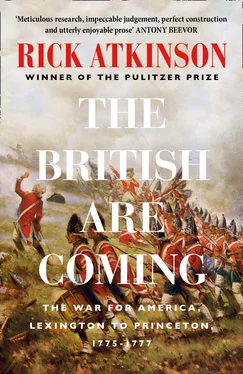Washington’s conceptions of military justice had been shaped by his years under stern British command. In the spring of 1757 alone, he had approved floggings averaging six hundred lashes each—enough to cripple a man, or even kill him—and presided over courts-martial that imposed more than a dozen death sentences. Such draconian measures were impossible in an army saturated with democratic principles, and Congress stayed his hand by restricting floggings to thirty-nine stripes (soon to be increased to a hundred, at his insistence). If a bit less vindictive, the cat-o’-nine-tails still fell routinely across the backs of convicted men tied to a whipping post known as the “adjutant’s daughter.” “Saw two men whipt for stealing,” a corporal wrote. “O what a pernicious thing it is for a man to steal and cheat his feller nabors, and how provoking to God!” A deserter was not hanged or jailed but sentenced to clean latrines for a week while wearing a sign printed with his offense. A felonious sergeant was drummed from camp with the epithet “MUTINY” on his back.
“My greatest concern is to establish order, regularity & discipline,” Washington wrote Hancock. “My difficulties thicken every day.” In truth, an immensely wealthy man to the manner born, with scores of slaves to tend his business in his absence, could hardly comprehend the sacrifice made by most of his men in leaving their families, shops, and farms in high season. For that vital link between commander and commanded to be welded imperishably, Washington would have to know in his bones—and the men would have to know that he knew—what was risked and what was lost in serving at his side.
Many small, private tragedies, unseen by his spyglass, would play out over the coming months and years. “News of the death of my child,” Lieutenant Benjamin Craft told his journal on August 14. “I hope it will have a sanctifying effect on me and my poor wife. I hope God will enable us to bear all he shall lay upon us.” Many were lonely, and fretful for the families they had forsaken. Captain Nathan Peters had recently lost two young children when he left his surviving one-year-old and his pregnant wife, Lois, in Medfield. She was to run their saddlery while he went to war. “Pray write every opportunity, for I live very lonesome,” Lois wrote him that summer. “Without some money we cannot carry on the trade any longer, for we have laid out all the money we had for leather.… My heart aches for you and all our friends there.… Our corn looks well.”
Yet Washington complained in August of “an unaccountable kind of stupidity … among the officers of the Massachusetts part of the army, who are nearly of the kidney with the privates.” New England troops generally “are an exceeding dirty & nasty people,” he wrote in confidence to Lund Washington, his cousin and the manager of Mount Vernon. “I need not,” he added, “make myself enemies among them by this declaration.” In short, His Excellency faced “so many great and capital errors & abuses … that my life has been nothing else (since I came here) but one continued round of annoyance & fatigue.”
The army surely had far to travel, but so, too, did its commander.
Aggressive and even reckless, Washington longed for a decisive, bloody battle that would cause Britain to lose heart and sue for a political settlement. That appeared unlikely in Boston, where “it is almost impossible for us to get to them,” he wrote. Instead, the summer and fall would be limited to skirmishes, raids, and sniping. “Both armies kept squibbing at each other,” wrote the loyalist judge Peter Oliver, “but to little purpose.”
American whaleboats continued to bedevil Admiral Graves, who warned “all seafaring people” that rebels were trying to lure British ships into shoal water with “false lights.” After raiders burned part of the tall stone lighthouse on Little Brewster Island, a rocky speck eight miles east of Boston, Graves sent carpenters guarded by almost three dozen marines to make repairs and relight the beacon. At two a.m. on Monday, July 31, a British sergeant roused the detachment there with a strangled cry, “The whaleboats are coming!” More than three hundred baying Yankees in thirty-three boats, led by Major Benjamin Tupper of Rhode Island, pulled for the shoreline. Marines stumbled to the water’s edge, “though not without great confusion,” a British midshipman recorded, “many of them in liquor and totally unfit.”
Rebel musket balls peppered the wharf and the stone tower, killing a marine lieutenant and several others. A few workmen escaped by swimming toward warships in Lighthouse Channel, but most were captured, along with twenty-four marines. Raiders seized the lantern and lamp oil, then set fire to the outbuildings, the keeper’s house, and the tower staircase before rowing to the mainland to receive Washington’s praise for their “gallant and soldierlike behavior.” One patriot observed that “the once formidable navy of Britain [is] now degraded to a level with the corsairs of Barbary.” The British Army tended to agree. “The admiral [is] thought much to blame,” Gage’s aide reported, while General Burgoyne was even harsher in a letter to London: “It may be asked in England, ‘What is the admiral doing?’ … I can only say what he is not doing.” Graves seethed, and plotted his revenge against the rebels.
Yet squibbing would not winkle the British from Boston, nor provoke them to give battle. Moreover, Washington could hardly wage a protracted campaign, given that his army was short of virtually everything an army needed: camp kettles, entrenching tools, cartridge boxes, straw, bowls, spoons. “The carpenters will be obliged to stand still for want of nails,” a supply officer warned, while another advised in late July, “We are in want of soap for the army.” American troops—badly housed, badly clothed, and badly equipped—were at war with the world’s greatest commercial and military power, long experienced in expeditionary administration. As an ostensible national government, Congress had begun to improvise the means to fight that war, from printing money and raising regiments to collecting supplies. But the effort thus far seemed disjointed and often half-baked. Although Congress had appointed quartermaster and commissary chiefs, the jobs were neither defined nor supported, and other critical supply posts—notably for ordnance and clothing—would not be created for another eighteen months.
Simply feeding the regiments around Boston had become perilous. Commissary General Joseph Trumbull, a Harvard-educated merchant and another of the Connecticut governor’s sons, frantically tried to organize butchers, bakers, storekeepers, and purchasing agents. Coopers were needed to make barrels for preserved meat, and salt—increasingly scarce—was wanted to cure it. Forage, cash, and firewood also grew scarce; an inquiry found that much of the “beef” examined was actually horse. To feed the army through the following spring, Trumbull told Washington, he needed 25,000 barrels of flour, 13,000 barrels of salt beef and pork, 28,000 bushels of peas or beans, 11 tons of fresh beef three times a week, and 22,000 pints of milk, plus 200 barrels of beer or cider, every day, at a total cost of £200,000. By late September, as prices spiraled and supply agents rode to New York to beg for flour, Trumbull worried that by spring the army would face starvation and thus have to disband. “A commissary with twenty thousand gaping mouths open full upon him, and nothing to stop them with,” he wrote, “must depend on being devoured himself.”
But no shortage was as perilous as that discovered in early August. Washington’s staff calculated that an army of twenty thousand men, in thirty-nine regiments with a hundred cannons, required two thousand barrels of gunpowder—a hundred tons. Powder was the unum necessarium , as John Adams wrote, the one essential. Each pound contained roughly seven thousand grains, enough for a volley from forty-eight muskets. A big cannon throwing a 32-pound ball required eleven or twelve pounds of powder per shot; an 18-pounder used six or seven pounds. A survey taken soon after Washington’s arrival reported 303 barrels in his magazines, or fifteen tons—enough to stave off a British attack, but too little for cannonading. “We are so exceedingly destitute,” he told Hancock, “that our artillery will be of little use.”
Читать дальше












